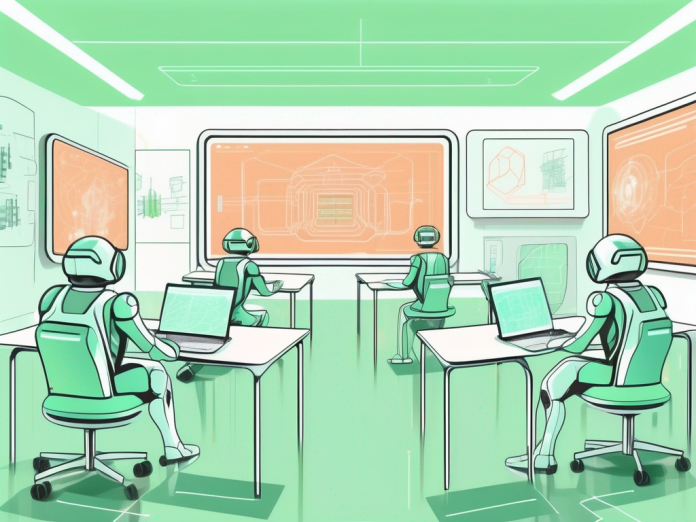Education is constantly evolving, and keeping up with the latest trends is essential for educators, students, and policymakers alike. In this article, we will explore the current educational landscape and examine the emerging trends that are shaping the future of education.
Understanding the Current Educational Landscape
Before we delve into the future, it’s important to have a clear understanding of the current state of education. One significant trend that is transforming classrooms worldwide is the role of technology. With the advent of digital tools and online resources, education is becoming more accessible and interactive than ever before.
The Role of Technology in Education
Technology has revolutionized the way we teach and learn. It allows students to access a vast amount of information at their fingertips, enabling them to explore and discover knowledge independently. From interactive whiteboards to educational apps, technology is enhancing the learning experience and fostering critical thinking skills.
Furthermore, technology has also opened doors to new learning opportunities. Online courses and virtual classrooms enable students to learn at their own pace and from the comfort of their homes. This flexibility is particularly beneficial for individuals with busy schedules or geographical constraints.
The Shift Towards Personalized Learning
Another trend gaining momentum in education is personalized learning. Gone are the days of one-size-fits-all instruction. Educators are now tailoring lesson plans to meet the unique needs and learning styles of each student. By incorporating individualized learning plans, students are more engaged, motivated, and empowered to take ownership of their education.
Personalized learning also promotes collaboration and critical thinking skills. Students have the opportunity to work on projects that interest them, developing their problem-solving abilities and fostering a sense of creativity. As education continues to evolve, the shift towards personalized learning will only continue to grow.
Emerging Trends in Education
The future of education holds even more exciting possibilities. Let’s explore some of the emerging trends that are poised to shape the landscape of education in the coming years.
The Rise of Online Learning
Online learning has already made significant strides in recent years, and it shows no signs of slowing down. The COVID-19 pandemic only accelerated the adoption of online learning platforms, making them a staple for both traditional and non-traditional students.
With online learning, students have the flexibility to learn at their own pace, access a variety of courses, and learn from experts around the globe. This trend is particularly beneficial for individuals seeking lifelong learning opportunities or trying to balance work and education.
The Integration of Artificial Intelligence
Artificial Intelligence (AI) is no longer confined to science fiction movies; it is becoming an integral part of our everyday lives, including education. AI-powered tools can analyze vast amounts of data to provide personalized feedback, identify areas for improvement, and even create customized learning plans for individual students.
Furthermore, AI can help automate administrative tasks, freeing up educators’ time to focus on building meaningful connections with students. By leveraging AI, educators can create personalized experiences and cater to the unique needs of each learner.
The Importance of Lifelong Learning
In the fast-paced, ever-changing world we live in, the importance of lifelong learning cannot be overstated. As technology continues to advance and industries transform, individuals must continuously update their skills and knowledge to stay relevant in the job market.
Lifelong learning encompasses both formal and informal education. Learning does not stop when we receive a diploma; rather, it becomes a lifelong journey of acquiring new knowledge, skills, and competencies. The future of education will continue to prioritize lifelong learning, preparing individuals for the challenges and opportunities that lie ahead.
The Impact of Globalization on Education
In an increasingly interconnected world, globalization has a significant impact on education. Let’s examine how international education policies and cross-cultural learning opportunities are shaping the future of education.
The Influence of International Education Policies
International education policies play a crucial role in fostering global citizenship and cultural exchange. As nations seek to improve their educational systems, they often look to successful models from around the world. This exchange of ideas and best practices enhances the quality of education for students everywhere.
Furthermore, international collaboration in education promotes diversity and a global perspective. By learning from different cultures and traditions, students develop a deeper understanding and appreciation for the world around them, fostering a more inclusive and interconnected society.
The Increase in Cross-Cultural Learning Opportunities
As borders become more permeable, students have increased access to cross-cultural learning opportunities. Whether it’s through study abroad programs, virtual exchanges, or international collaborations, students are exposed to different languages, perspectives, and ways of life.
These cross-cultural experiences not only broaden students’ horizons but also equip them with valuable intercultural skills. The ability to navigate and thrive in diverse environments is an essential skill in today’s globalized world.
The Challenges and Opportunities of Future Education
While the future of education holds immense promise, it also brings its fair share of challenges. Let’s explore how educational inequality and the potential of virtual reality in classrooms are key areas to watch.
Addressing Educational Inequality
Education should be the great equalizer, providing opportunities for all. However, educational inequality remains a pressing issue around the world. Economic disparities, access to resources, and cultural biases continue to perpetuate a system where not all students have an equal chance to succeed.
Addressing educational inequality requires a multi-faceted approach. Governments, educators, and policymakers must work together to provide equitable access to quality education, regardless of a student’s background or socio-economic status. By investing in education and prioritizing equal opportunities, we can create a more just and inclusive society.
The Potential of Virtual Reality in Classrooms
Virtual reality (VR) has the potential to revolutionize the way we learn. Imagine being able to journey through history, explore distant galaxies, or understand complex concepts through immersive experiences. Virtual reality has the power to transport students beyond the confines of the traditional classroom, making learning engaging and memorable.
While still in its early stages, the use of virtual reality in classrooms is steadily increasing. From virtual field trips to hands-on simulations, VR technology enhances student engagement and understanding. As the technology becomes more accessible and affordable, we can expect to see VR becoming a core tool in classrooms, transforming the learning experience and expanding educational possibilities.
Preparing for the Future of Education
As the educational landscape continues to evolve, it’s essential to prepare for the future. Let’s explore the skills needed for future learning and the crucial role of teachers in shaping the future of education.
The Skills Needed for Future Learning
In a rapidly changing world, traditional knowledge and skills alone are insufficient. As we look towards the future, there is a growing demand for individuals who possess a range of skills, including critical thinking, problem-solving, creativity, adaptability, and collaboration.
These skills, often referred to as “21st-century skills,” are the building blocks for success in the future job market. They empower individuals to navigate uncertainty, innovate, and continuously grow and learn. It is crucial for educational institutions to foster these skills in students, preparing them for future challenges and opportunities.
The Role of Teachers in the Future of Education
While technology plays a pivotal role in education, teachers remain the cornerstone of the learning experience. The future of education relies on skilled and passionate educators who can adapt to changing classroom dynamics and leverage technology to enhance teaching and learning.
Teachers play a vital role in fostering critical thinking, creativity, and a love for learning. They guide, inspire, and mentor students, helping them unlock their full potential. As education continues to evolve, it is essential to invest in professional development opportunities for teachers, equipping them with the necessary tools and knowledge to navigate the future of education.
As we look ahead, the future of education holds great promise and exciting possibilities. From advances in technology and personalized learning to global collaboration and the cultivation of essential skills, the future is bright. As educators, students, and policymakers, it is up to us to embrace these trends and work together to shape a future of education that empowers all learners and creates a more equitable and inclusive society.




























